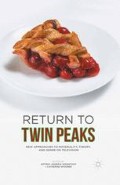Abstract
American television has traditionally been perceived as a producer’s medium with the executive producer/showrunner overseeing all elements of the series’ production. Within TV drama, this role has increasingly become associated with the writer as the majority of showrunners enter television production from a writer’s background. For instance, of the 24 producers profiled and interviewed in James L. Longwor th Jr.’s two-part publication on TV Creators, 22 of them began working in television as writers, with only 2—Barry Levinson and Ed Zwick—better known as directors. Roberta Pearson argues that the most successful of these writer-producers, or “hyphenateauteurs” as she describes them, have, within an increasingly competitive broadcast landscape, been granted greater creative freedom over their television series, positioning writers such as Aaron Sorkin, Tina Fey, David Simon, Joss Whedon, and Alan Ball, to name just a few, as auteurs within the television industry (17). This stands in contrast to the cinema where the director is usually held to be the leading creative force and/or auteur, overseeing all aspects of a film’s production and binding the creative elements together into one coherent vision. On television, however, the director holds a secondary position, often hired on an episode-by-episode basis and with less input to the overall vision of the show, as compared to the writer-producer. As a result, the role and contribution of the television director remains an underexamined area within contemporary television studies.
Access this chapter
Tax calculation will be finalised at checkout
Purchases are for personal use only
Preview
Unable to display preview. Download preview PDF.
Works Cited
Bianculli, David. “ Twin Peaks.” The Essential Cult TV Reader. Ed. David Lavery. Lexington: The University of Kentucky Press, 299–306. Print.
Booy, Miles. “ Twin Peaks.” The Cult TV Book. Ed. Stacey Abbott. London and New York: I.B. Tauris, 2010. 28–30. Print.
Caldwell, John Thornton. Televisuality: Style, Crisis, and Authority in American Television. New Brunswick, NJ: Rutgers University Press, 1995. Print.
Chion, Michel. David Lynch. 2nd ed. Trans. Robert Julian. London: BFI Publishing, 2006. Print.
Deschanel, Caleb. Interview. Twin Peaks: The Second Season. Disc 3. Paramount Pictures. DVD.
Dolan, Marc. “The Peaks and Valleys of Serial Creativity: What Happened to/on Twin Peaks.” Full of Secrets: Critical Approaches to Twin Peaks. Ed. David Lavery. Detroit, MI: Wayne State University Press, 1994. 30–50. Print.
Fenn, Sherilyn. Interview. Twin Peaks: The Second Season. Disc 6. Paramount Pictures. DVD.
Holland, Todd. Interview. Twin Peaks: The Second Season. Disc 2. Paramount Pictures. DVD.
Jowett, Lorna. “Plastic Fantastic?: Genre and Science/Technology/ Magic in Angel.” Channeling the Future. Ed. Lincoln Geraghty. Lanham, MD: Scarecrow Press, 2009. 167–81.Print.
Jowett, Lorna and Stacey Abbott. TV Horror: Investigating the Dark Side of the Small Screen. London and New York: I.B. Tauris, 2013. Print.
Kalinak, Kathryn. “‘Disturbing the Guests with This Racket’: Music and Twin Peaks.” Full of Secrets: Critical Approaches to Twin Peaks. Ed. David Lavery. Detroit, MI: Wayne State University Press, 1995. 82–92. Print.
Lavery, David. “Peaked Out.” Film/Literature Quarterly 21.4 (1993): 239, 305. Print.
Longworth, Jr., James L. TV Creators: Conversations with America’s Top Producers of Television Drama. Syracuse, NY: Syracuse University Press, 2000. Print.
——. TV Creators: Conversations with America’s Top Producers of Television Drama Volume Two. Syracuse, NY: Syracuse University Press, 2002. Print.
Page, Adrian. “Post-modern Drama.” The Television Genre Book. Ed. Glenn Creeber. London: BFI, 2001. 43–46. Print.
Pearson, Roberta. “The Writer/Producer in American Television.” The Contemporary Television Series. Eds. Michael Hammond and Lucy Mazdon. Edinburgh: Edinburgh University Press, 2005. 11–26. Print.
Plummer, Laura. “‘I’m Not Laura Palmer’: David Lynch’s Fractured Fairy Tale.” Film/Literature Quarterly 25.4 (1997): 207–11. Print.
Richardson, David. “ Angel Hits 100.” TV Zone no. 173. 2004: 32–35. Print.
Rodley, Chris, ed. Lynch on Lynch. London and Boston: Faber and Faber, 1997. Print.
Rosenbaum, Jonathan. “Bad Ideas: The Art and Politics of Twin Peaks.” Full of Secrets: Critical Approaches to Twin Peaks. Ed. David Lavery. Detroit, MI: Wayne State University Press, 1995. 22–29. Print.
Sheen, Erica and Annette Davison, eds. The Cinema of David Lynch: American Dreams, Nightmare Vision. London and New York: Wallflower Press, 2004. Print.
Telotte, J. P. “The Dis-order of Things in Twin Peaks.” Full of Secrets: Critical Approaches to Twin Peaks. Ed. David Lavery. Detroit, MI: Wayne State University Press, 1995. 160–72. Print.
Thompson, Robert J. Television’s Second Golden Age: From Hill Street Blues to ER. Syracuse, NY: Syracuse University Press, 1996. Print.
Todd, Anthony. Authorship and the Films of David Lynch: Aesthetic Reception in Contemporary Hollywood. London: I.B. Tauris, 2012. Print.
Woods, Paul A. Weirdsville USA: The Obsessive Universe of David Lynch. London: Plexus, 1997. Print.
Editor information
Copyright information
© 2016 Stacey Abbott
About this chapter
Cite this chapter
Abbott, S. (2016). “Doing Weird Things for the Sake of Being Weird”: Directing Twin Peaks. In: Weinstock, J.A., Spooner, C. (eds) Return to Twin Peaks. Palgrave Macmillan, New York. https://doi.org/10.1007/978-1-137-55695-0_10
Download citation
DOI: https://doi.org/10.1007/978-1-137-55695-0_10
Publisher Name: Palgrave Macmillan, New York
Print ISBN: 978-1-349-57140-6
Online ISBN: 978-1-137-55695-0
eBook Packages: Literature, Cultural and Media StudiesLiterature, Cultural and Media Studies (R0)

